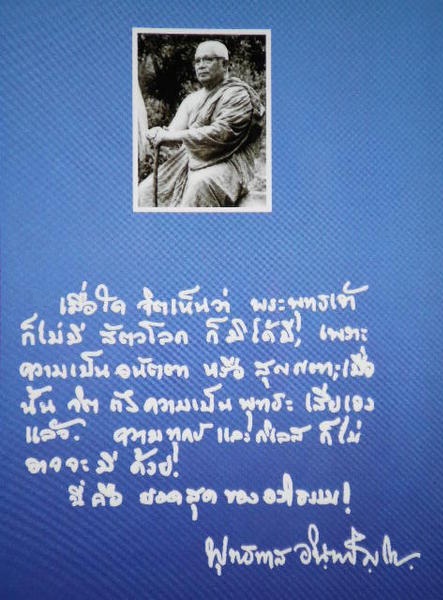๑๑ ม.ค.๒๕๕๖
[พุทธธรรมกำมือเดียว]
๑๑. พระพุทธเจ้าท่านกล่าวต่อไปว่า "กิเลสต่าง ๆ มันจรเข้ามาสู่จิตใจของเราต่อภายหลัง จิตที่เคยประภัสสรมาเดิมจึงมัวหมองไป" คือ เมื่อสิ่งใดมายั่วยวนตาหูจมูกลิ้นกายใจ เราก็ไปยึดเอาสิ่งนั้นเข้ามาไว้ในความนึกคิดจนเกิดเป็นความรักบ้าง เกลียดบ้าง กลัวบ้าง เพราะการเข้าใจไปว่าสิ่งนั้นมันเป็นคุณหรือโทษแก่ตัวเราหรือของเรา
11. The Buddha further said that all the various mental defilements tend to fight with our mind till it become impure. Whatever thing that comes to entice the eyes, nose, tongue, body and mind, we will cling to it till the feelings of love, hatred, or fear arise because we tend to regard it as either of benefit or harm to us.

๑๒ ม.ค.๒๕๕๖
[พุทธธรรมกำมือเดียว]
๑๒. ปุถุชนทั่วๆ ไป ย่อมมีความโน้มเอียงไปในทางที่จะยึดอารมณ์ทุกชนิดเข้ามาไว้ในใจ และชอบนึกคิดติดอยู่ในอารมณ์นั้น ๆ ในศาสนาคริสเตียนสมัยใหม่ เขาจึงถือว่านี่แหละเป็นบาปดั้งเดิมของมนุษย์ คือไม่เข้มแข็งพอที่จะวางใจไว้เป็นกลาง ๆ คือไม่ชังและไม่ชอบ ทางศาสนาพุทธก็เรียกความโน้มเอียงอย่างนี้ว่าอวิชชา หรือความรู้เท่าไม่ถึงการณ์ ความโง่ ความหลงผิด ซึ่งจะต้องละให้ได้ มิฉะนั้นจะไม่พ้นทุกข์
12. The ordinary people tend to cling to whatever 'arom' or feelings that arise in their mind and they normally think in the context of such feelings.
They lack the sense of impartiality. In modern Christianity, this is regarded as the original sin of humankind-not strong enough to stay neutral, i.e not to hate nor to like. Buddhist regards this inclination as 'avijja' or ignorance which has to be removed if one wishes to be liberated from suffering.

๑๓ ม.ค.๒๕๕๖
[พุทธธรรมกำมือเดียว]
๑๓. จริงอยู่ ทุกคนที่เ่กิดมาย่อมมีนิสัยสันดานสืบมาจากบิดามารดาและบรรพบุรุษบ้างทางพันธุกรรม (อนุสัย) แต่มันก็นอนนิ่งอยู่ในสันดาน ไม่เป็นอันตรายแก่ใคร ถ้าไม่ไปกวนอนุสัยให้มันฟุ้งขึ้นมา สิ่งแวดล้อมหรือกิเลสต่างๆ ที่จรเข้ามาใหม่ต่างหาก ที่ทำให้สิ่งที่นอนสงบนิ่งอยู่นั้นฟุ้งขึ้นมา ถ้าเรามี "วิชชา" กล่าวคือความรู้ในการดับทุกข์ อวิชชาก็เกิดขึ้นมาไม่ได้
13. It is true that everybody who is born into this world is bound to carry the trails from the parents or ancestors in a hereditary way. It simply lies dormant but the enviromental factors or human desires may 'sneak' in to disturb it, causing it to burst forth with full force ; if we possess 'vijja' or the knowledge to extinguish suffering, 'avijja' will not be able to surface.

๑๔ ม.ค.๒๕๕๖
[พุทธธรรมกำมือเดียว]
๑๔. หากมันเกิดขึ้นแล้วมันก็ตั้งอยู่ได้สักพักหนึ่ง แล้วมันก็ดับไปเช่นสิ่งทั้งหลายในโลก อวิชชามิได้มีอยู่เป็นประจำตลอดไปอย่างที่คัมภีร์อภิธรรมว่า สิ่งที่สงบนิ่งอยู่ในสันดานก็ยังไม่ใช่อวิชชาเพระามันยังไม่เป็นโทษแก่ใคร ดุจโคลนตมที่จมอยู่ก้นบ่อน้ำ ย่อมไม่ทำให้น้ำในบ่อขุ่น น้ำที่อยู่เหนือโคลนตมก็ยังผ่องใสสะอาด ใช้อาบใช้กินได้ แต่ถ้าใครไปกวนโคลนก้นบ่อให้มันลอยขึ้นมา หรือไปเอาโคลนตมที่อื่นมาใส่ ความโง่เช่นนั้นหรือการกระทำเช่นนั้นจึงเป็นอวิชชา
14. Should 'anusaya' or latent tendency explode into full action, it will be there for some time and then it will get extinguished, just like many other thing in the world. 'Avijja' is not there to stay forever as in stated in Abhidhamma ; the thing that lies dormant in the instinct is not 'avijja' because it is still not yet a harm to anyone. It is like the mud that lies at the bottom of a well ; it does not make the water muddy. The water above the mud is still clear and clean, and it can be used for bathing and drinking ; but if some one were silly enough as to stir the mud that is lies at the bottom, the water will then turn muddy, unfit for bathing and drinking. Such an act of foolishness is 'avijja'.

๑๕ ม.ค.๒๕๕๖
[พุทธธรรมกำมือเดียว]
๑๕. น้ำในทะเลตามปกติมันควรจะเรียบเป็นหน้ากลอง เพราะธรรมชาติเดิมของน้ำมันเรียบอย่างนั้น แต่ที่มันไม่เรียบหรือกลายเป็นคลื่นใหญ่ ๆ ก็เพราะลมพายุ แผ่นดินไหว หรือแม้แต่การแล่นของเรือ จิตใจของคนเราก็เป็นอย่างเดียวกัน คือ มันควรสงบไม่วุ่นวายเป็นปกติวิสัย ถ้าจิตใจเกิดหวั่นไหวผิดธรรมดาไป ก็เป็นเพราะมีสิ่งใดมากระทบกระเทือนความนึกคิดของเรา
15. Sea water ought to be smooth and at one same level, because water in Nature has a smooth surface, but then the sea is rough with rising and falling waves because of the wind or the movement of the earth or even the sailing ships. Our mind is also the same. Under normal circumstances, it ought to be calm ; but when something 'strikes' the mind, it sends ripples across and the mind no longer remains still.
"I" and "MINE" ตัวกู-ของกู ที่มา : ภาคผนวก ของหนังสือ
"I" and "MINE" From
BUDDHADASA BHIKKHU ตัวกู-ของกู [พุทธทาสภิกขุ]
Kungwan AngkaewJan : G+ สานต่อปณิธานพุทธทาส


























































